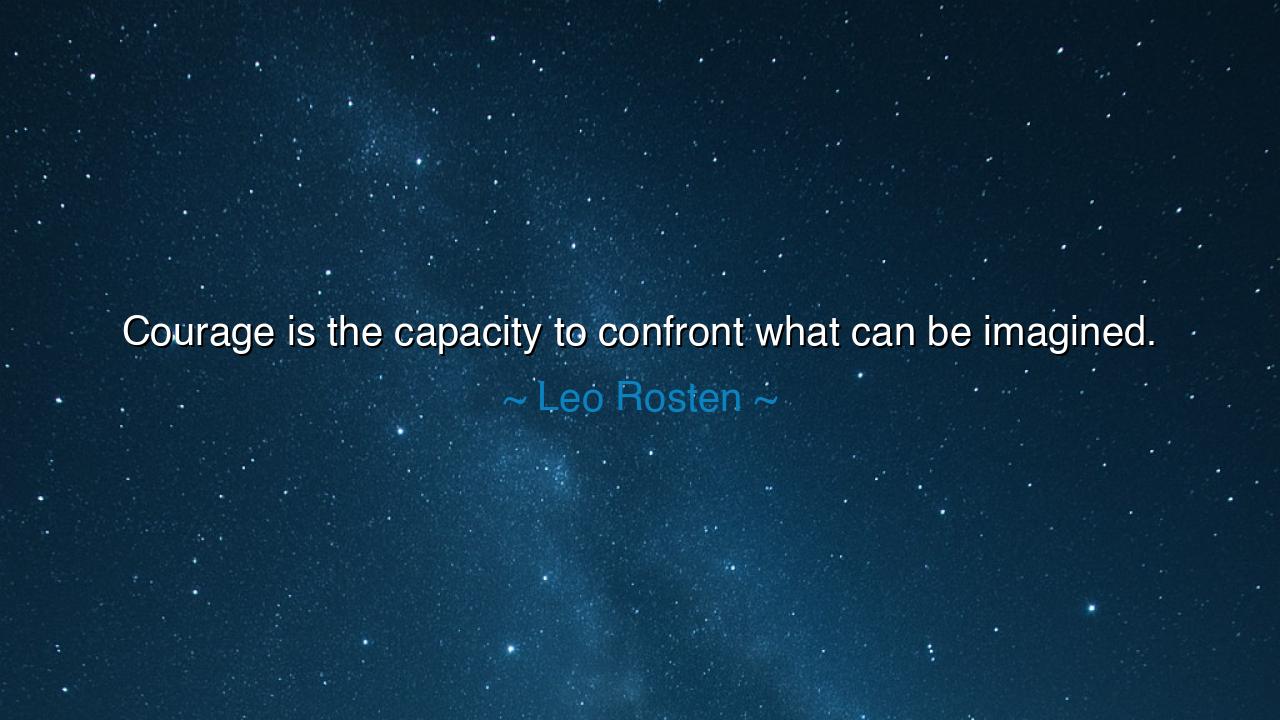
Courage is the capacity to confront what can be imagined.






In the clear yet profound words of Leo Rosten, a thinker of wit and wisdom, we find this stirring reflection on the human spirit: “Courage is the capacity to confront what can be imagined.” At first glance, the saying may seem subtle, even quiet — yet within it lies the thunderous truth of the human condition. For fear, as Rosten knew, is not born of reality alone, but of the mind’s own power to imagine — to see, before it happens, every possible pain, failure, and loss. And so courage, in its truest form, is not the absence of fear, but the mastery of imagination itself.
Leo Rosten, a scholar, humorist, and keen observer of human nature, spent his life studying how people think, speak, and live. Best known for his insights into language and character, he understood that much of what governs human behavior is not what is real, but what is perceived. His quote captures this truth with elegant simplicity. To “confront what can be imagined” is to face the vast inner landscape of dread that the mind itself creates. Most of us are not defeated by the world, but by the shadow of the world that we conjure within ourselves. Thus, Rosten redefines courage as the rare ability to face not only the dangers of the external world but also the phantoms of our own thought.
This is a wisdom as ancient as humanity itself. The warriors of old feared not only the sword but the uncertainty before the battle. The philosopher feared not death itself but the thought of dying. Even the artist fears not the blank page, but the voice of doubt that whispers failure into the imagination. The ancients taught that the mind is both the battlefield and the weapon. As the sage Seneca once wrote, “We suffer more often in imagination than in reality.” Rosten’s insight continues this lineage of wisdom — he reminds us that the greatest act of courage is to face not what is, but what the mind believes could be.
To understand this truth, consider the story of Eleanor Roosevelt, a woman whose life embodied the courage Rosten describes. Born into privilege yet scarred by insecurity, she once said she lived much of her youth “in the shadow of fear.” Yet she taught herself to do the very things that frightened her most. When she became First Lady, she stepped beyond every expectation of her role — speaking publicly, advocating for justice, traveling into war zones. She once declared, “You gain strength, courage, and confidence by every experience in which you really stop to look fear in the face.” In her, we see the power of confronting what can be imagined — for her fears were real only until she faced them.
Rosten’s insight also speaks to the age in which we live — an age of unseen fears and invisible storms. In every generation, humanity has faced threats: war, illness, loss, uncertainty. Yet in truth, it is often our own imagination that magnifies these challenges beyond their size, painting the future in darker tones than reality demands. To live courageously, therefore, is not to silence imagination, but to discipline it — to use it not for panic, but for preparation; not for despair, but for vision. Imagination, when mastered, becomes not a source of fear but a source of power.
This kind of courage is not loud or reckless. It is quiet, steady, and inward. It is the courage of the parent who sends their child into the unknown, of the dreamer who begins a new path despite doubt, of the soul who faces grief and says, “I will continue.” For to confront what can be imagined is to master the storms before they come, to walk through the valley of fear before one’s feet even touch the ground. Such courage is the heart of wisdom, for it turns anxiety into awareness and imagination into insight.
Let this, then, be the lesson passed down: do not run from what your mind imagines — face it, name it, and walk through it. When fear paints its shadows, light a lamp of truth. When uncertainty whispers, remember that most terrors lose their teeth when seen in the open. Practice, each day, the art of confronting small fears — a difficult word spoken, a challenge embraced, a truth faced. In doing so, you train your spirit for the greater trials ahead.
For as Leo Rosten reminds us, courage is not found in ignorance of danger, but in the capacity to confront it — both within and without. The world may test you, but your own mind will test you more. Face its storms with steadiness, its shadows with light, and its doubts with faith. Then you will know the true meaning of courage: not the triumph of strength over weakness, but the triumph of clarity over fear, and of imagination mastered by wisdom.






AAdministratorAdministrator
Welcome, honored guests. Please leave a comment, we will respond soon